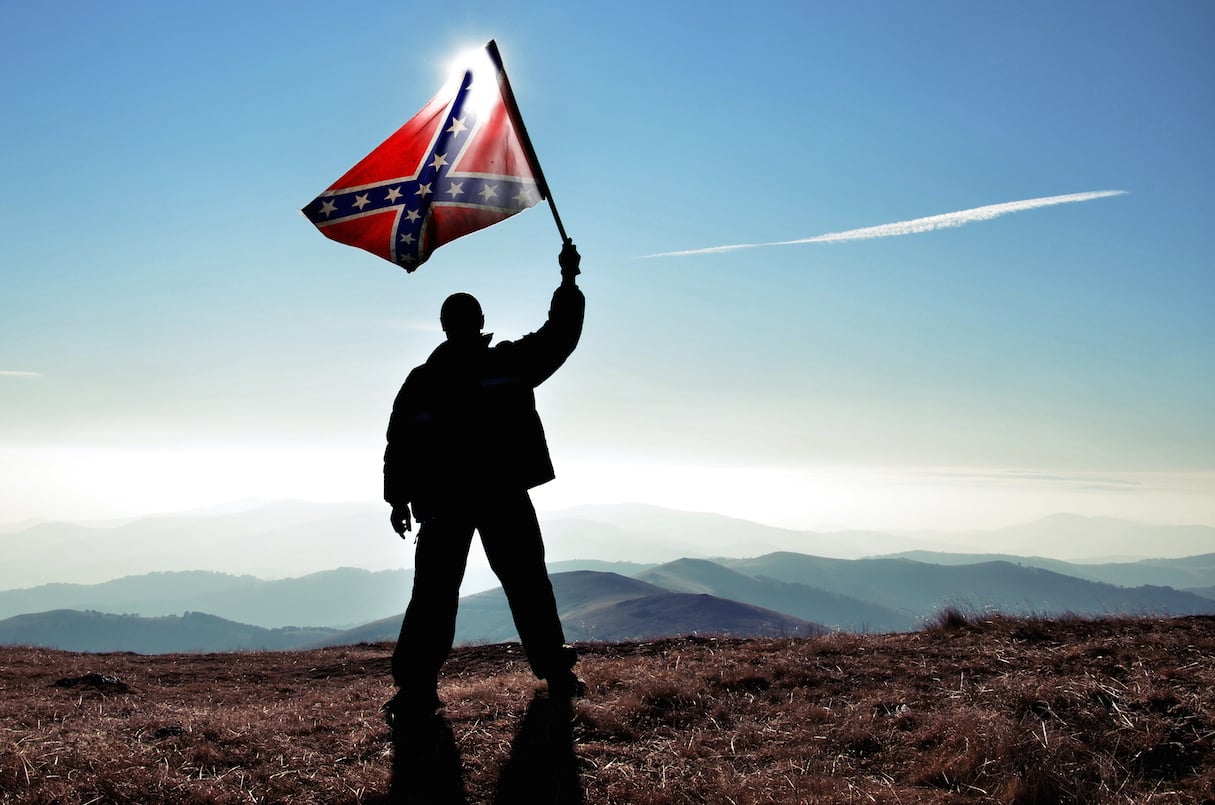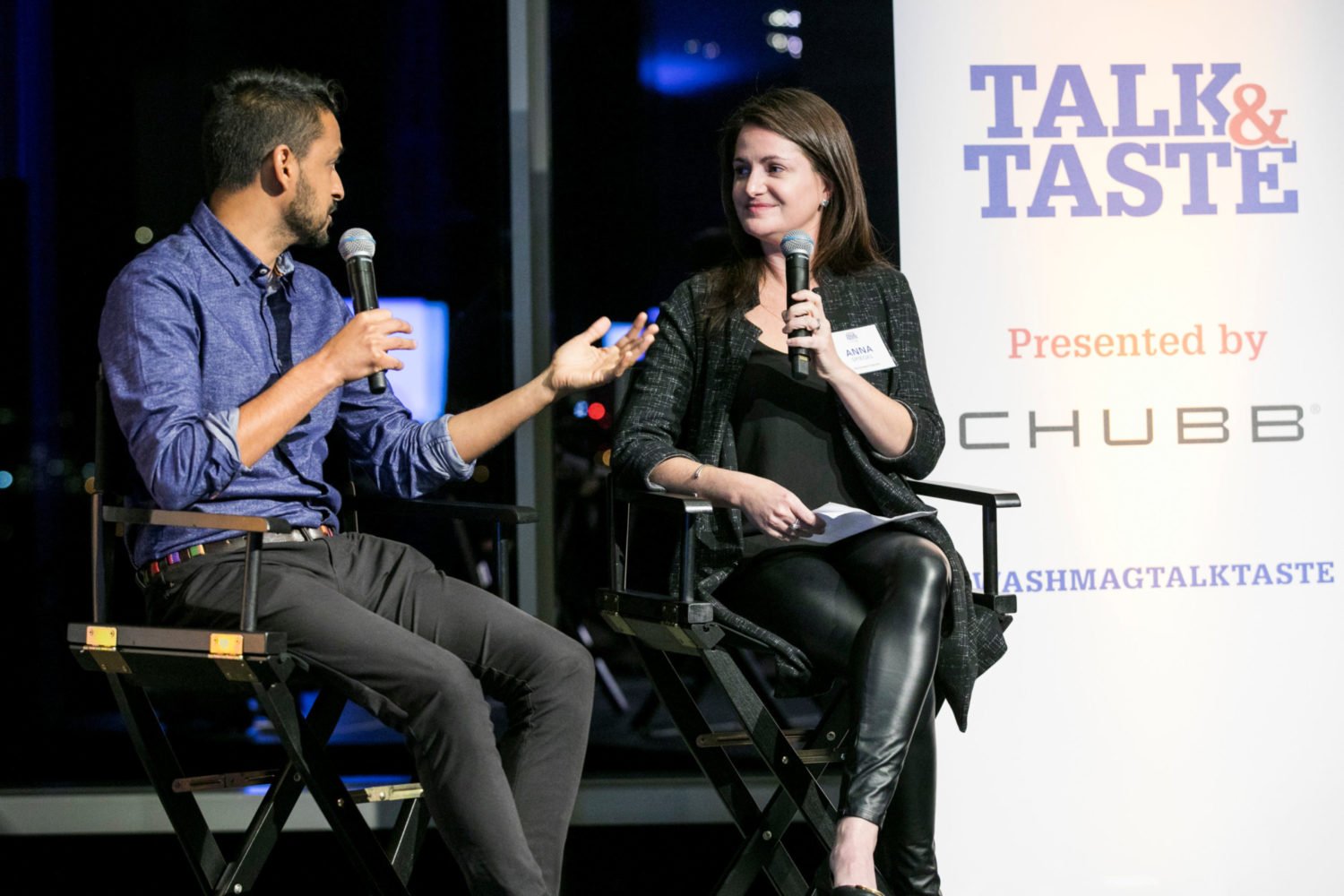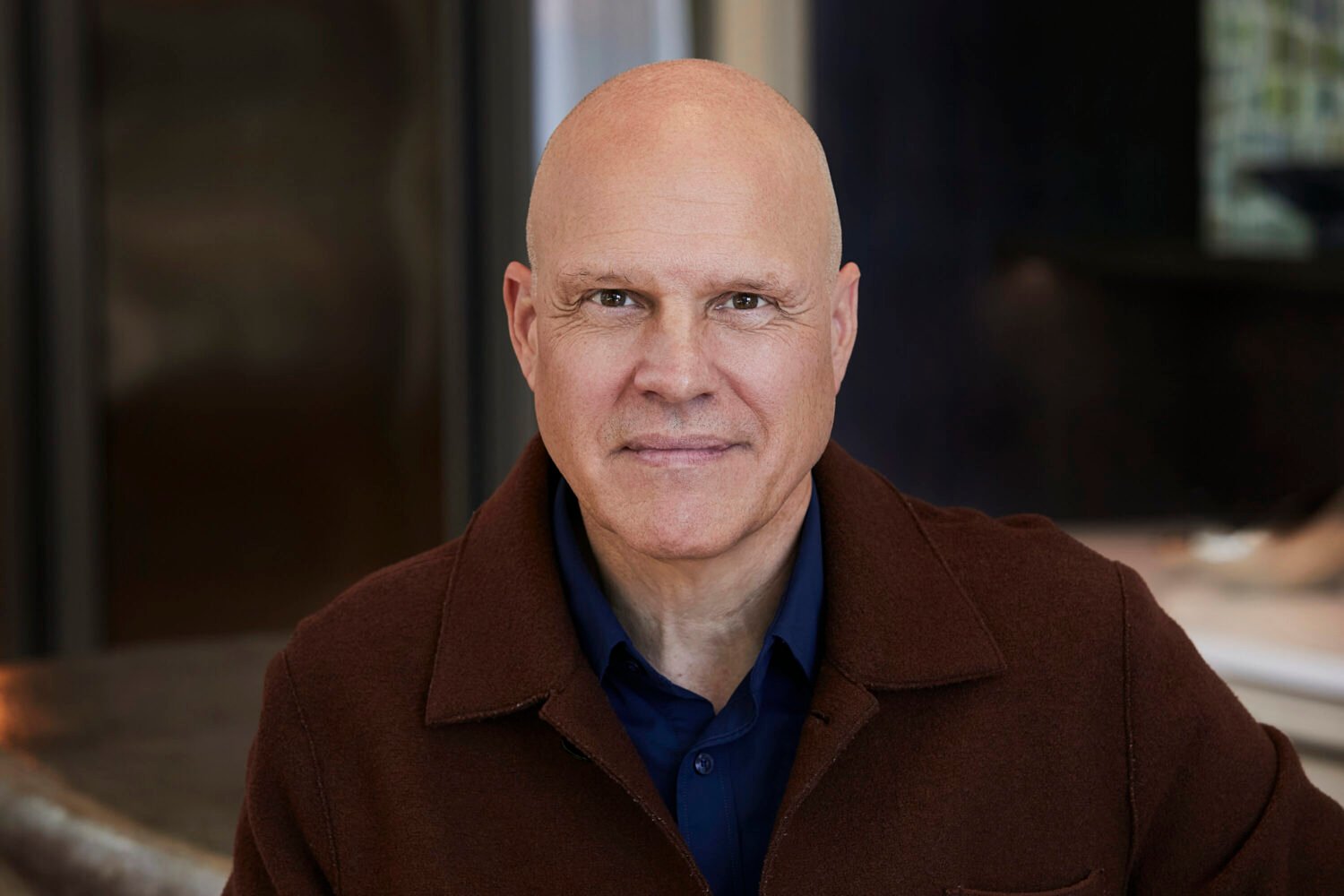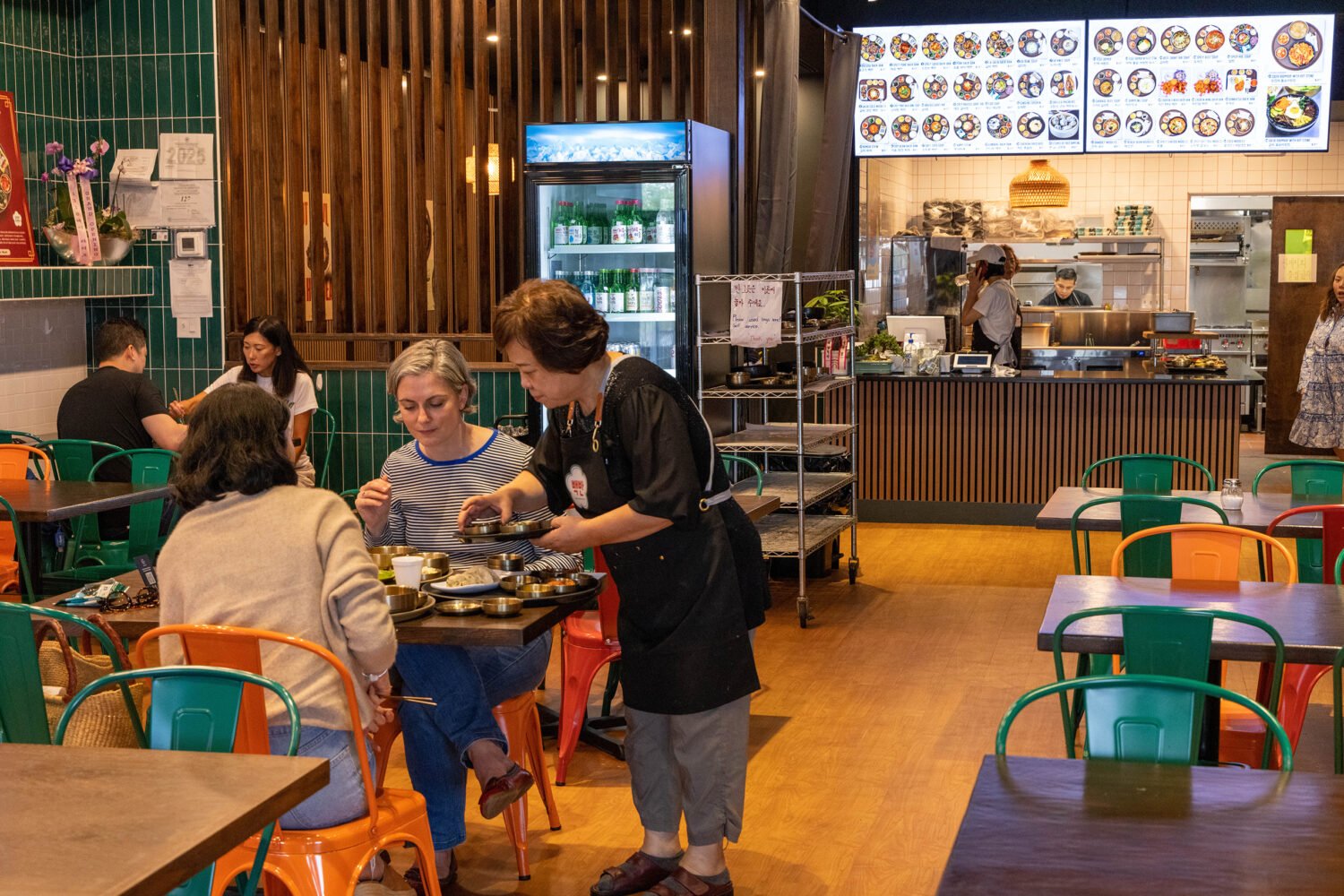
If you want to understand why the Confederate flag refuses to die, and why it is more than symbolic for so many people, then you need to sit down and watch Kevin Willmott’s brilliant CSA: Confederate States of America. Made in 2004 and released in 2006, the film, which Willmott wrote and directed, does what the reams of commentary on the flag doesn’t: It connects the dots and dramatizes (and exposes) a state of mind.
I watched it twice in one night when it first came out on video, and last week I screened it for the third time (it can be streamed on Netflix—a minor astonishment to me for a service that is generally dismissive of challenging films on the margins). It was just as thrilling and heady as I’d remembered.
CSA is sometimes referred to as a mockumentary, a moniker that brings to mind sly, Christopher Guest-style parodies; it doesn’t come close to describing the incisive, iconoclastic project Willmott has set for himself. I prefer to think of CSA as an alternative history, one set into vertiginous motion by a provocative question: What if the South had prevailed?
The result—a documentary shot as if for British television, and including commercials—is frightening, funny, and deeply unsettling. Lincoln suffers the fate of Jefferson Davis, and goes into exile; disguised in blackface, the fleeing president is escorted along the Underground Railroad by Harriet Tubman. Later, D.W. Griffith makes a silent film about it: The Hunt for Dishonest Abe. (The fake archival footage of Lincoln in Canada, lonely and embittered, is poignant and disturbing and reason enough to view the film.)
A rich and expansion-hungry superpower emerges as one century gives way to another. The Confederate States conquer Mexico (an actual target of the expansion-minded confederacy), followed, in rapid succession, by Central and South America. In the ’30s, the Confederate president meets with Hitler, advising him not to exterminate the Jews but to put them to work and maximize the potential of the abundant free labor. Canada becomes a haven for expatriates, from Richard Wright to James Baldwin to Elvis Presley, who finds a willing home for his “abolitionist-inspired” race music. At the moon landing, the Confederate flag flies proudly.
Interspersed throughout are commercials, and Willmott scores some of his most direct hits with them: a TV show called Runaway eerily recalls Cops, and a high-tech gadget called the Shackle (a hilarious parody of cheesy, cheery, low-budget TV ads) draws uncanny parallels with modern-day probation monitors.
At least part of what makes CSA so unsettling is not just that so much of what Willmott depicts might have been true, but that so much of it is true—in spirit, if not always in fact.
I wanted to know more about the making of the film and the ingenious mind behind it, so I reached out to the director last week at his home in Lawrence, Kansas, where he teaches film at the University of Kansas.
In a wide-ranging conversation, conducted over the course of a few days, Willmott and I talked about the flag, Obama, political correctness, the failure of American education, David Brooks, and why he prefers rednecks to white liberals.
When the news broke that 9 black people had been killed in a church shooting in Charleston, setting off a week of outrage and alarm and calls to take the Confederate flag down, you must have thought about your film at some point, right?
Oh yes, of course. I really made the film to get rid of the flag.
No kidding.
No kidding. You see it all the time. Even in Kansas, where I live. There’s a guy with the flag on his truck.
That flag is everywhere. The fact that it was moved from the capital in South Carolina to that other place of honor [the state’s military history museum], it’s a symbol that the war never really ended.
It took the murder of nine beautiful people in a church for the Governor and the leaders of the state to think that the flag that murdered an American president and enslaved thousands of African-Americans should be removed.
They took it down. Reluctantly.
One of the ironies of calls to take down the Confederate flag is that it is a way of affirming what the American flag stands for. It is a way of saying: we don’t stand for that kind of brutality, that kind of oppression. But the American flag has flown for a long time, and over genocide, over Jim Crow, over a kind of ongoing war over the past 50 years.
The Confederate flag is a dead symbol, is the symbol of a dead regime, of people who were fighting for the other America. Even though America has a lot of flaws and done a lot of things wrong in the past, horrible things, the American flag at least is a living symbol. America can get better.
I love America, but I love America for what it can be not so much for what it is. I love America’s promise, I want to push America further. And what the flag means to me is promise. I think people get mad at progressives, artists, because they want to believe we’ve already arrived.
So you say: I’m going to write a film that will bring down the Confederate flag, wherever it flies. That was what drove you to create CSA?
Well, at first it was my anger at the flag but then as I wrote the film and we started making the film, that’s when I started to see how the South really had won.
How so?
Where I live, the free state of Kansas, the home of John Brown the abolitionist, became segregated after the war. It’s the Brown v. Board of Education of Topeka case that desegregates the schools. How did Topeka become segregated—didn’t the North win? Dr. King’s march through Chicago was his most dangerous, not the South.
After the war, the South taught the North their way of life–it took another conflict, the American Civil Rights movement, to bring the CSA into the USA. That fight continues. There was never a victory over the South, more of a cease-fire like North Korea and South Korea.
The fight now is a conflict over gay rights, women’s reproduction freedom, voting rights and African-American leadership symbolized by President Obama.
Every election day you see the divide.
In your mind, then, the battle of North and South continues, though not necessarily, at this point, as a North-South skirmish?
Oh, very much so. I mean, I’m living in Confederate America here in Kansas.
Confederate America is a place that doesn’t want people to have health care, it’s hard on poor people, it doesn’t respect the rights of gay people, it wants to put young people in prison for drugs, it wants to be hard on human beings.
The CSA attempts to limit freedom, while the USA has the promise of true freedom. When I understood this reality I finally completed loving being an American. The promise of being an American is all we have to combat the Evil Empire of the CSA.
It’s hard for me at least not to see Obama as the target for Dylann Roof. He murdered those nine people in that church, but it was an assassination by proxy. Fear of Obama, rage over Obama, the illegitimacy of Obama, and with all of that the growing unease and impotence of a segment of white American.
When Obama was elected, it really brought out all these things, all these buried kind of animosities and angers, pent-up hatreds, that you knew were always beneath the surface.
I got to see that kind of even before his election, when I traveled around with the film. I remember when it opened in Memphis, I went to do promotion—travel around, do TV, radio. And there was a Fox station in Memphis, and I went in there and brothers would come up to me, anchors, and whisper: “I really love your film, man.” Another brother at the station said: “Brother, are you out of your mind?”
When I left this old lady at the reception counter said: “The South will rise again.”
Not whispering.
No! Loudly. Proclaiming.
We’ve seen so many instances of police brutality come to light, in such a short time. Is it a coincidence, or not quite, that so many of these crimes have occurred during the tenure of Obama?
I don’t think there is a direct connection. Racist terrorist murders like Charleston and police brutality are two different things. Charleston connects with the legacy of the crimes of the Civil Rights Movement, things like the four little girls and the murder of Medgar Evers and civil rights workers. Police brutality has been going against black people since the creation of police forces. Black people are not shocked about police crimes, we are just pleased at the invention of video on cellphones so that witnesses can now document the event. In the past, it was just our word against the police and we would always lose those cases. Now we have clear proof and we still lose. It’s a step forward!
The thing that does link the two together in a subtle way is the backlash against Obama. We should have known that the Tea Party and perhaps even increasing police brutality is a repercussion of black progress. Historically we should have been better prepared because it has always happened. That’s why the Republicans had a special meeting the night Obama was elected. They decided then to refuse to work with him on any level and even more importantly to try and destroy him.
One of the interesting things about CSA is that, ideologically speaking, it’s hard to get a fix on. It’s not predictable. It disturbs on multiple levels. The film is not comfortable for conservatives, to be sure, but it’s not comfortable for liberals, either. I mean, Exhibit A—the controversy over the film at the Dalton School, in New York City, a private school for the elite, in early 2014. Do you think it had to do with people not realizing that someone black directed it? Which then raises the next question—why is it so important for people to “know where someone is coming from” instead of what they have to say?
What’s ironic is that Spike Lee’s kids went to school there, and he presents the film, and they still didn’t understand what the film was about, and these are some of the most liberal people in New York City.
The Dalton School problem is an example of that distance I am getting at. Liberal people want to hide the big elephant from their children because someone didn’t get the joke. It is better to remove than to explain. I got a lot of hate mail from conservatives, Confederates, and racists, but I was censored by liberals.
It’s important to know a black person directed because we don’t trust each other. Whites want permission to respond, laugh, and care. Blacks want to know they are not being attacked. It’s a mine field. When you make a film like CSA you better be ready for whatever. And whatever did happen, I just hate it that some innocent people like Larry Peterson were hurt with losing a job. Only in America.
I’m not familiar with that.
He’s the actor who plays Fauntroy [one of the major characters] in the film. He was VP at Time Warner in Kansas City, and they were honoring him out here, showing clips of films he’d been in, and they showed a clip from CSA—I wasn’t there—and the audience was shocked and he was fired. And that has to be one of the first times someone was fired for playing a character in a film. They could not divorce the part he was playing from him. It was so disturbing. And Time Warner was the distributor of the film!
You want to say to people: Hannibal Lecter is not actually eating people, it’s acting. It shows you how deep and how toxic and how fearful we are of the subject.
Was it Shaw who said, If you want to tell people the truth, you’d better make them laugh, otherwise they’ll kill you?
Well, and sometimes even if you’re funny.
Do people know that it’s funny? I mean, it’s very funny, but the kind of funny that makes you squirm.
Right. I don’t do the All in the Family, Norman Lear, kind of wink at the camera—I’m on your side. I didn’t let the audience know that it’s okay. I never let the audience off the hook.
Implicated.
No doubt about it. Implicated. In a lot of ways, CSA is like an exorcism.
Did you have any idea of how much this film would strike a nerve? Scratch that: nerves.
When you work on something like this, you think, Well, okay, this is gonna be really interesting, to see what people say. But really you’re thinking: Is it funny? Is it interesting? Is it working? I wasn’t worried so much about offending people as much as I was about making sure I was making a good film.
The goal was to tell what I thought was an honest history, but I wanted to be factual, I wanted it to be something I could defend, and that the film had real meaning behind it. It wasn’t just an attempt to be provocative, a flamethrower.
What’s so interesting, and disturbing, about the film is not that all that you show us plausibly could have happened; it’s that in some ways it already has.
That was always the point. It’s not a what if, it’s a what is.
How I backed up the choices I made in the film was by basing them on what did occur. People have asked me: Do I think slavery could have continued into the modern world? Well, it did in South Africa. Here we were, modern nations looking at Nelson Mandela, looking at a huge population without civil rights, and people thought that was fine. And that lasted until the ’80s and ’90s.
You’re a political filmmaker, which I almost hate to say, because some will take that as a pejorative. Because there’s a belief in certain aesthetic quarters that politics should not mix with art, that to introduce politics into art is to corrupt it.
I guess you have to say I’m not limited to that. You know, I think that I have some political things I want to say, and most of my films have something to do with politics. It’s not that I’m not interested in human emotion, but for me I think you really can’t separate the two. I think American film often tries to separate the two, but I think what most African-Americans know is that politics affects your day-to-day life, and in ways you don’t want it to. I just try to acknowledge that.
I think we’re taught early on that you’re not supposed to talk about it, it’s not part of the day-to-day life. If you talk about race every day, it becomes easier to talk about.
We do the same thing with race we do with death.
Right. We put old people over there, out of sight, out of mind. They get sick, we move them out. People don’t have the tools to deal with all this.
People say, what was your reason for making the film? Well, to tell the truth. Of course, my truth is different from someone else’s truth, based on the things I have seen and believed. I do not think that’s different from a guy writing about human emotion or human relationships. To put it in a different category, is to really hurt society. What CSA tries to do is to do both.
Real freedom in art is having the freedom to make any choice when it’s appropriate to the work.
Talk to me about satire, and how you regard its uses and/or its potential in an open society.
Satire is essential in a free society. Satire can bring out truths that journalism and other forms of examination cannot. The challenge becomes when people are less informed about history and politics and news, and you have to explain the subject before the joke. That’s why The Daily Show works so well. They first show the news clip or explain the news story and then comes the satire. There was no explanation needed for Dr. Strangelove—people knew the issues or at least understood the basic make up of the world of nuclear war. It’s tough when you make a film like CSA, or my new film, Destination: Planet Negro! where you are relying upon the audience to know some basic history facts.
In Chicago, where CSA premiered, a friend told me a black couple didn’t get the film. He said because he didn’t think they knew one of the main characters portrayed in the film—Dr. George Washington Carver. The less we know about American history or world politics the harder it is to satirize it to a mass audience in an intelligent manner.
You mentioned your new film. What can you tell me about it? I love the title, by the way. I’m assuming it’s a satire, and I’m also assuming you wrote and directed it.
You assume correctly.
Here’s the premise: in 1939, Black leaders secretly meet to creation a solution to the “Negro Problem” in America. They arrive at the conclusion to leave the planet. Dr. George Washington Carver creates a rocket fuel derived from the peanut and the sweet potato. A rocket ship takes off with three astronauts headed to Mars, but instead time travels and arrives in the present where they find a Black president. The film explores how far African Americans have come and how far we still need to go. It will play in select cities in the fall.
I want to go back to what you were talking about just a second ago, about our educational system—for one thing, the fact that so many kids, white and black, know nothing about black history apart from Martin Luther King, Jr. I saw the problem when I taught college. Also the fact that both white and black are encouraged to see black history as black history, as separate and not intrinsic and indispensable to an understanding of what it means to be an American. So, my question to you: if I were to appoint you Secretary of Education, with a specific task of addressing what is so lacking in us, what facts do you put into the curriculum? And what specifically do you have these kids explore?
I would put in all the uncomfortable things. Slavery and details of how it worked. The Holocaust and all the details. The Civil Rights movements and all the details. It is the details that we don’t know and can’t handle. When kids watch CSA at school they aren’t bored with history, because if you can explain the film to young people they see how dangerous and important history is.
The problem is many teachers can’t teach the film—an example of this is the liberal Dalton School. You would think it would be conservatives that are the problem, but liberals are just as afraid of the reality of things, only in a different way. Conservative don’t know and don’t wanna know. Liberals think they know – and become super sensitive.
It’s not about shocking students, it’s about the shocking reality of our story as Americans. You have to be able to use all the tools available to you to make students care about the world. We don’t do that.
The sense I get—and it’s a sense and not anything I know for certain, because as we’ve been talking about things are rarely if ever dealt with, even among liberals who ought to want to deal with things—is that whites are fatigued by talk of race. (Fatigued, yes: I can already hear you laughing. If y’all are fatigued, then imagine what we are!) It seemed to me that the reparations talk that we heard in the early 2000s was appealing for some white liberals because it held the promise of closing the door on all that unpleasantness. Let’s move on, shall we?We’re progressives, we’re not bound by the past. It’s a new day, a new age, etc., etc. Obama’s election, in 2008, was greeted by many white liberals as this great closing of the circle; it was not what he seemed to promise as the leader of the Democratic Party in an uncertain age, it was what he seemed to promise to do (by not doing; simply by being) in healing the unhealable wound. White liberals, as I see it, need to know that the wound is healable; they need to believe that we can get past all this. I’m of the belief that we can’t. Not with programs, not with “dialogue,” not with social engineering.
Americans just want it to be over. They want to wake up one day and it’s a Happy Days episode.
White liberals are a problem. They are the ones that want things to go away. They care up to a point. I like rednecks—I know they hate me, I know they don’t care. I can move them from where they are to a better place. It’s hard to move someone that thinks they already know. Things will continue to get more and more complicated, like with the lady that posed as black. As far as I’m concerned she was black. She had a black attitude. She cared about us. She is probably more black than a lot of actual black people. Certainly Clarence Thomas.
Race is an attitude, a belief system, AND a skin color. Race is incredibly important and incredibly unimportant. We need to know who we are, where we come from, and what it means and then we should be able to move past it and not allow it to be a bearer from working with and loving others. I learned that growing up in an Army town filled with multiracial people. My father looked white and could pass for white and did when he had to work in Western Kansas. The white construction company he worked for would be out of town on a job and the hotel would say—no Negroes. And his boss would say, “He’s not Negro he’s an Indian.” My father was then allowed to stay. That is a sad story but my father was born in 1898, 30 some years after slavery. He was 60 years old when I was born. He would tell me, “Son, it’s a white man’s world.” He grew up in Mississippi at the turn of the century. For him it was “Mississippi Goddam”!
He went to the sixth grade then had to go to work. He told me one time he was so hungry they had to eat roots from a tree. He could have never imagined a black president. I think about him a lot and about how things have changed and have not.
Are we in a better or worse time, now, from the one in which you made CSA?
I think we’re in a time that’s about the same as were were when I made the film. Which I completed in 2004. It was released in 2006. I think what has changed is that we have a great African-American president who has made us all feel a bit more hopeful about the country, and at the same time we have learned that the people that are against justice and fairness and equality are not gonna give up. They are strong and in some ways maybe getting stronger, and that conflict will be going on for some time. We still are deep in denial. We still can’t quite go there. We’ve been forced to go there, but nothing changes we do go there, nothing ever really changes.
It’s like school shootings. One horrible school shooting after another, and people ask: Will this now make it harder for crazy people to get guns? And then another one happens and we have the same discussion all over again. We go from horrible incident to horrible incident.
When CSA came out, I was on some local TV, but I’ve never been on a national TV show where I’ve been able to talk about the film or my approach or any of that. I don’t think that that’s coincidence. I think it’s our inability to deal with the difficulties of race.
Spike was telling me a while back—I co-wrote the movie, Chiraq, which will be coming out later this year— the New York Times wouldn’t show images from Bamboozled. We know what the movie’s about. I grew up seeing The Legend of Nigger Charlie on a marquee.
Isn’t this one of the problems with PC? That by removing the painful images and words you don’t necessarily make the world a better place; often, what you do is to put a shiny varnish on history; you falsify the times, make them simpler and more digestible.
That term PC is used a lot and abused a lot, but it’s deeper than political correctness. It goes to a kind of self-censorship that happens. Because we really don’t want to go there. The joke I always make out here is, when you get in an elevator with people, talk about the Royals.
The problem is, it’s not a joke for a lot of people. We think that if we can all just get in the elevator and talk about the Royals, we’ll be fine. We think that that is racial harmony and sexual harmony. But the problem is that these damn events keep happening. And it’s forcing us to get real with each other. And the media can’t help us.
That great secular arbiter, the media. Judge and jury for everything that roils the society.
Right. Exactly. And the media can’t break that other wall down. That’s what you see literally every night on the news.
We hear this sentence a lot in certain quarters of the media culture—”we need to have a dialogue about race.” What do you think that means, exactly? Personally, I don’t think it means what the people who say it (both black and white) think it means. I don’t think they mean dialogue, an exchange between two people. I think what is meant is: white people need to confront the original sin of this nation. Confront it not just as an event that happened, but as an event that is, in many ways, still happening. This seems to me to be, at least in part, the purpose of Ta-Nehisi Coates’s new book, and a good bit of his writing. What’s your view on this? Are we talking about a dialogue or a monologue in which one side is made to listen, in an effort to become broader, more enriched, more empathic? Is an actual dialogue possible? Or is it possible eventually?
What you hope it means is there is a real honest back and forth about the problems of race in the country. That never happens. Instead, a few black people are brought on TV and they break it down and white people listen or tune out and that’s it. Many white people think race is never a problem; most black people think it’s a non-stop burden. Most white people know racism is a bad thing, and they don’t want to ever be called racist. We have succeeded in teaching that much. However, most regular everyday white people don’t have the ability to talk about race. White intellectuals in the media barely have the capacity.
The same goes for most African-Americans—many of us are angry or fearful. However, more black people are equipped to teach and discuss race than whites. We talk about race constantly. Most of us I believe want to talk about race in some form. That’s why it would first have to be a monologue because an educational process first would need to take place.
We first have to learn to trust each other and agree on terms of the discussion. Then hopefully a real dialogue could transpire.
I always hoped CSA could help facilitate the process of education and eventually dialogue, but there was too much fear and ignorance for it to occur. Most white people I believe care about African-Americans, but they have their own issues: the problems of family, money and personal insecurities. It is a luxury to think about race and equality. Until we are all better off in terms of those daily pressures that dialogue will be difficult. Those pressures assist in creating the animosities of race. That is a huge part of why things don’t move forward.
Speaking again of Coates: did you read David Brooks’s New York Times column about his book? The sense I get from him—and from many whites—is that they want very badly for there to be some kind of acknowledgment from black Americans that “progress has been made.” The ferocity of feeling on that score is not as intense as many blacks wanting whites to acknowledge that in substantive ways things haven’t changed in the society, but it’s interesting to me that when race does get discussed/debated in intelligent ways this is one of the fulcrums: Say it; say we’ve made progress; say that the American Dream is alive and well. And: No; not going to say it; not going to feed a falsehood; not going to give in to those notions.
The Brooks column is a back-handed compliment. Brooks is a moderate and wants to understand, but can’t fully give in to the reality Coates expresses: “It couldn’t be that bad.”
But Brooks doesn’t have close relatives in prison and he hasn’t been pulled over for nothing by the police and he doesn’t need to fear for the basic survival of his children. He hasn’t worried about finding a job or lost one for no clear reason.
I’m not trying to take a cheap shot—Brooks wants to understand, but that “White Man” part of him screams the American system serves everyone equally and demands he defend it. Where is Watermelon Man when you need him?
Otherwise is Washingtonian food critic Todd Kliman’s weekly column. Sometimes, it’s about food.

















